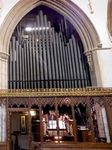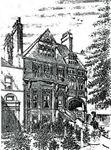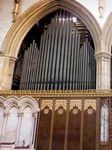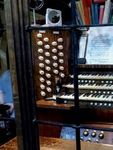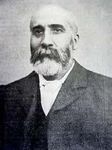Hunting for Hunters Paul Hale
←
→
Page content transcription
If your browser does not render page correctly, please read the page content below
Hunting for Hunters
Paul Hale
I wonder how many readers more. I have a Hunter catalogue
have heard or played an organ by from about 1922 – an elegant and
A. Hunter & Son of Clapham? It’s modest publication, compared
not a name that regularly crops up with most company ‘puffs’ of the
in organ circles outside London, time – which lists about half of
yet the company built many superb these instruments. Both sources
instruments, mainly but certainly of information remind us that the
not exclusively in the Greater company built some particularly
London area. A glance at the NPOR significant organs, many of which
reveals no fewer than 258 organs have been rebuilt or replaced, but a
listed; there will have been many large number remain, still playing.
The 258 NPOR-listed organs
date from across the whole period
of the firm’s existence – 1856 to
1937, when it was bought by Henry
Willis III. It is worth bringing to
mind some of the more significant
of these before turning to the two
three-manual Hunters which are
the main focus of this article. Many
three-manual organs of 30–36
stops were made. Larger three-
manual Hunter organ were made
for Sedbergh School Hall, Christ
Church and St Philp & St James in
Cheltenham, Eton College Lower
Chapel (since replaced), St Paul’s,
Southsea, Queenswood School,
Beckenham Congregational Church,
St Mark’s Bromley, Holy Spirit,
Clapham, St Peter’s, Clapham (and
several other Clapham churches), St
Augustine’s, Highgate, All Saints’,
Langham Place, St James’, Spanish
Place, the Welsh Church of Central
London, Crescent Congregational
Church Beckenham, St John the
Evangelist Putney, St John the
Baptist Windsor, and St Andrew’s
Worthing.
Four-manual organs were made
for Clapham Wesleyan Chapel, for
Westfield Lodge, Surbiton (a 51-
stop house organ), for St Cuthbert’s
Philbeach Gardens, Earl’s Court,
and a five-manual with three 32fts
was installed in the capacious
36 • March 2019something old, something new
residence of J.M. Boustead in
Wimbledon (an astonishing 105
stops – some of which are now in
St Mary the Virgin, Ringmer. See
NPOR N13956).
All the larger Hunter organs had
particularly well-developed Swell
Organs – almost always the largest
department, with magnificent reeds
and spacious, lofty swell boxes
enabling all the pipes to stand
unmitred. Philbeach Gardens is an
impressive example:
Bourdon 16
Open Diapason 8
Stopped Diapason 8
Keraulophon 8 Robert Hunter The family house &
Voix Celeste 8 – Organ builder workshop in Clapham
Echo Salicional 8 (photo: Musical Opinion December 1931) (The Builder: 1885)
Echo Voix Celeste 8
Octave 4
Octave Gamba 4
Souls’, Langham Place, my path left the partnership in 1864, ‘to
Super Octave 2
had not again crossed Hunter’s become a publican’ (according
Harmonics III 17.19.22
until recently. Following a DAC to Laurence Elvin’s researches),
Contra Fagotto 16
inspection visit to a small but Hunter ran the firm on his own from
Horn 8
perfectly-formed Hunter here 1881, moving three miles south to
Oboe 8
in Nottinghamshire (St Peter’s, High Street, Clapham, and taking
Vox Humana 8
Widmerpool), which delighted me, his son Robert (born 1856) into
Clarion 4
I received an invitation to survey partnership in 1885, the firm then
Two modest organs were made for the large Hunter in St Andrew’s becoming A. Hunter & Son. Robert
Oxbridge college chapels – a 2/19 Worthing. At much the same time, took over the firm on Alfred’s death
for Magdalene College, Cambridge Nicholson & Co. were working in 1911, in turn taking his sons
(installed 1928, replaced in 2001) on a complete refurbishment of Alfred (jr), Robert (jr) and George
and a 3/26 of 1931 for Hertford the Hunter organ in the Welsh into partnership in 1921. Robert
College, Oxford. This latter organ, Church of Central London. The (sr) died in 1932 and the firm was
dating from six years before the firm final section of this article is an taken over by Willis, as has already
was sold to Willis, was restored outline description of these two been mentioned, in 1937.
by the Willis firm in 1971 and I distinguished organs – one fully Their earlier organs used
well remember as a New College restored; the other in serious need mechanical action, but an efficient
undergraduate going to listen to of restoration. tubular-pneumatic mechanism and
Noel Rawsthorne giving a splendid But first, who was Hunter? And, up-to-date consoles (many of which
opening recital that Autumn. It from where did this London-based are still in use, some electrified)
was only the second Hunter I had firm spring? were fitted to most of their organs
heard, the first being the very much Alfred Hunter, a Londoner, was from the start of the twentieth
larger and better-known instrument born in 1827, apprenticed to G.M. century. They clearly offered
in St James’ church, Spanish Place, Holdich (of Greek Street, Soho) exceptional value for money, for
London. The Spanish Place Hunter and then went to work for Henry among the many London firms, in
is a truly wonderful organ with Bevington (also working in Greek late Victorian and Edwardian days
the finest stopped 32ft Sub Bass (a Street), before joining J.C. Bishop they seemed to be able to offer a
Hunter speciality) you are likely (whose workshop was in the client more for his money than
ever to come across (see NPOR neighbouring Marylebone area) in other metropolitan builders, some
N08089). Both organs impressed the early 1850s. A fellow craftsman of whom (notably J.W. Walker)
me with their fine reeds, excellent at Bishop’s, Mr Webb (whose were very expensive.
Diapason choruses, resonant flutes, Christian name I have been unable
first-class strings, and sonorous so far to find) married Alfred’s sister,
pedal basses. Sophia, and in 1856 Hunter and
Other than giving a recital on Webb set up their own company in
the much-rebuilt Hunter in All York Road, Lambeth. Webb having
March 2019 • 37St Andrew’s, Worthing, specification
GREAT CHOIR (enclosed except Tubas)
Double Open Diapason 16 Geigen Diapason 8
Open Diapason Major 8 Lieblich Gedacht 8
Open Diapason Minor 8 Viol d’Amour 8
Clarabella 8 Unda Maris 8
Dolcan 8 Harmonic Flute 4
Octave 4 Harmonic Piccolo 2
Hohl Flute 4 Clarionet 8
Super Octave 2 Orchestral Oboe 8
Mixture 17.19.22 III Tuba Mirabilis 8
Double Trumpet 16 Tuba Clarion 4
Trumpet 8 PEDAL
SWELL Open Diapason Wood 16
Lieblich Bourdon 16 Violone 16
Open Diapason 8 Bourdon 16
Stopped Diapason 8 Lieblich Boudon (Swell) 16
Salicional 8 Octave Diapason 8
Voix Celeste 8 Bass Flute 8
Echo Gamba 8 Trombone 16
Echo Voix Celeste 8
Octave 4
Super Octave 2
Harmonics 15.19.22 III
Contra Fagotto 16
Cornopean 8
Oboe 8
Clarion 4 Console
St Andrew’s, Worthing £220,000 today, which would buy Rushworth & Dreaper, fitted electro-
The large organ in St Andrew’s, less than half that number of stops. pneumatic conversion machines,
Worthing, was made in 1902/3, The Swell soundboard was made electric pistons and generally
with a handsome console with with 12 extra treble notes for use overhauled the instrument. In more
angled jambs, though lacking any with the octave coupler, perhaps recent years Bishop & Son have
sort of casework. It was one of no inspired by the same device carried fitted a modern combination system
fewer than eight new organs the out by Hunter’s mentor, Holdich. to the console and have carried out
Hunter firm worked on during The pneumatic mechanism lasted some modest releathering. There
1902. Despite its size (42 speaking until 1963 when the Compton firm, it sits today, awaiting a decision
stops including five at 16ft pitch) it executing one of their very last as to the future of this beautiful
cost less than £2,000; that is about contracts before being taken over by and formerly very musical church,
Tubas Organ front
38 • March 2019something old, something new
before a restoration project can
even be imagined. I enjoyed
playing it and climbing around it.
Its wonderful reeds would not be
out of place in a large cathedral.
A glance at the specification
will give the reader an idea of the
power, variety and colour this
instrument boasts.
The wind system is now failing, Compton electrics from 1963
the 1963 electrics are going the
same way, the exceptionally fine the Worthing Hunter in 1963, so
spotted-metal pipework is in need A. Noterman of Shepherds Bush
of restoration and the console needs carried out the same to the Welsh
a complete refurbishment. But the Church Hunter a couple of years
structure is basically sound, the later. They fitted their own patented
soundboards are of superb quality, ‘compound magnets’ to the main
with much mahogany, and are in soundboard actions (a type of
generally excellent condition. The magnet also often used by Compton
sound remains glorious, just as one in the bass of their larger unit chests,
can imagine from reading through reintroduced in recent years in the
the stop list. If ever a high-romantic work of a few UK firms), undertook
British organ deserved a restoration, some releathering, moved the Swell
it is this one. Let us hope that it Piccolo to the Choir (on a unit chest)
comes to pass. and fitted a new Fifteenth to the
The Hunter in the Welsh Church Swell in its place. As at Worthing,
of Central London was made seven much of the tubular pneumatic
years later than the Worthing action remained.
instrument, and though somewhat
smaller, is cut from the same cloth,
as a glance at the stop-list will show.
As at Worthing, it has the luxury of
a 70-note Swell soundboard. Just
as Compton partially electrified
March 2019 • 39something old, something new
Welsh Church specification CHOIR
Geigen Diapason 8
Lieblich Gedacht 8
GREAT SWELL Dulciana 8
Open Diapason (Major) 8 Bourdon 16 Wald Flute 4
Open Diapason (Minor) 8 Open Diapason 8 Piccolo 2
Clarabella 8 Stop’d Diapason 8 Clarinet 8
Octave 4 Salicional 8 PEDAL
Harmonic Flute 4 Voix Celestes 8 Open Diapason 16
Super Octave 2 Octave 4 Sub Bass 16
Trumpet 8 Fifteenth 2 Lieblich Boudon (Swell) 16
Harmonics 15.19.22 III Octave Diapason 8
Cornopean 8 Octave Bourdon 8
Oboe 8 Trombone (added, ex. RCM) 16
The Welsh Church
After 50 years’ more use, the
organ was in serious need of a full
restoration. In 2016 a contract was
awarded to Nicholson & Co., which
carried out the work during 2018.
Everything was done – soundboards
fully restored, split wooden pipes
repaired, all leatherwork replaced,
console completely rebuilt with its
casework slightly reduced in size
and some stop-knobs moved to more
logical positions, new electrical
fittings and equipment throughout,
general pistons added, the Noterman
compound magnets completely
refurbished, slider solenoids fitted
to replace the old slider machines,
case-pipes repainted, with some
gilded details, a new blower, and the
Piccolo fitted to a new slide added
Composition pedals fitted with switches to the Choir soundboard. The only
tonal alteration was the addition of
the 1901 Walker Trombone from the
former organ in the Concert Hall of
the Royal College of Music, which
Nicholsons had removed in 2016
to make way for the College’s new
Flentrop.
The Welsh Church organ was
re-opened by Jane Watts on 6th
October 2018 in a memorable
concert also featuring the A5 Brass
Ensemble and Côr Llundain.
Meanwhile, the larger Hunter
in Worthing awaits its fate. Of all
the remaining large Hunter organs
this is the most significant; let us
profoundly hope that it, like that
in the Welsh Church, receives a
worthy restoration. Meanwhile,
inspired by my recent researches
into these fine organs, I shall
certainly go hunting for some more
Soundboard with Noterman compound magnets being restored Hunters – as I hope our readers will
do, too.
March 2019 • 41You can also read





